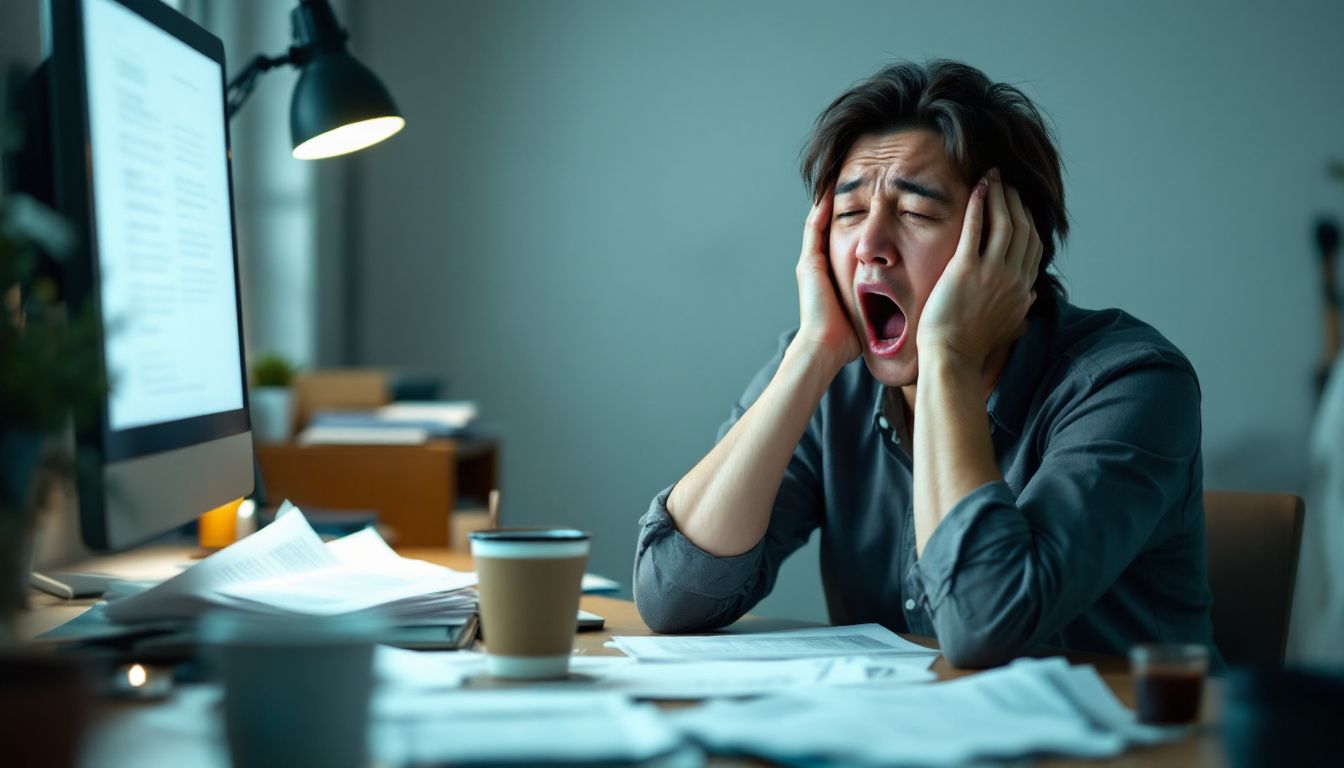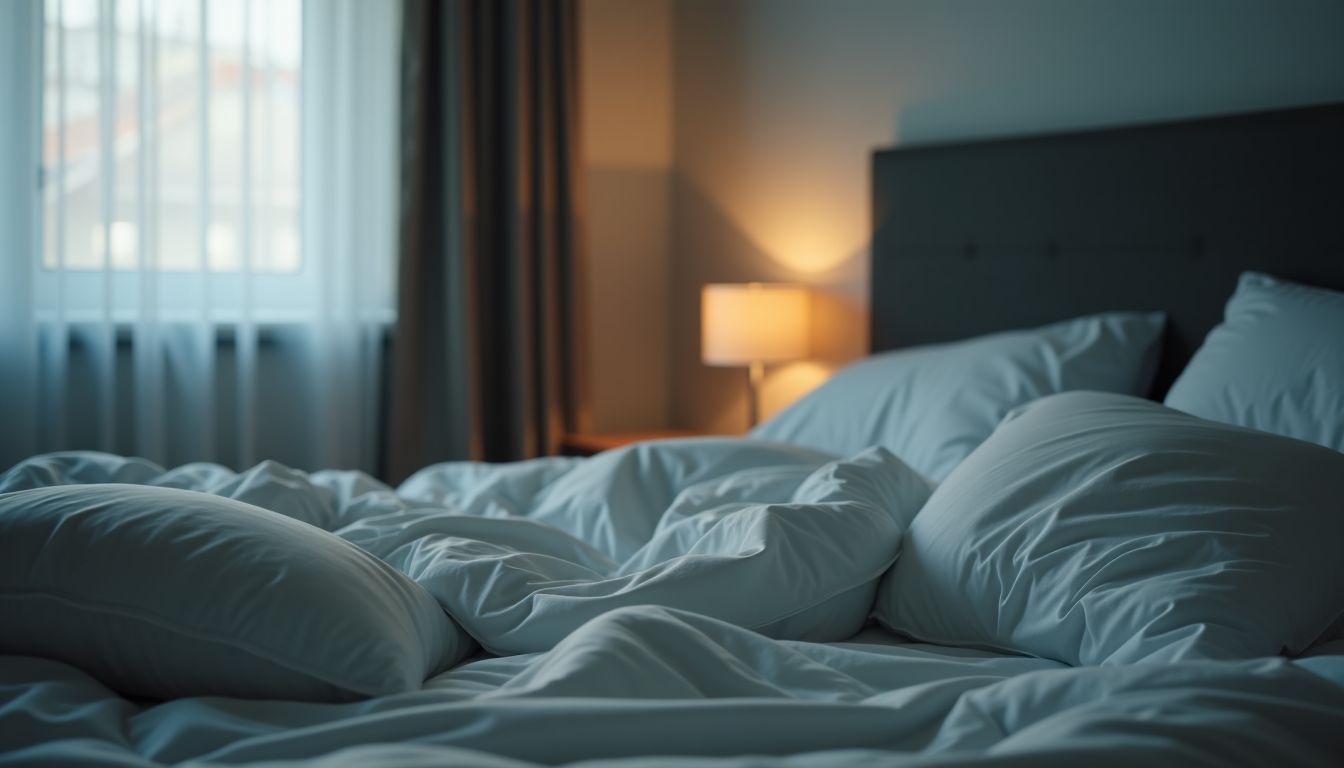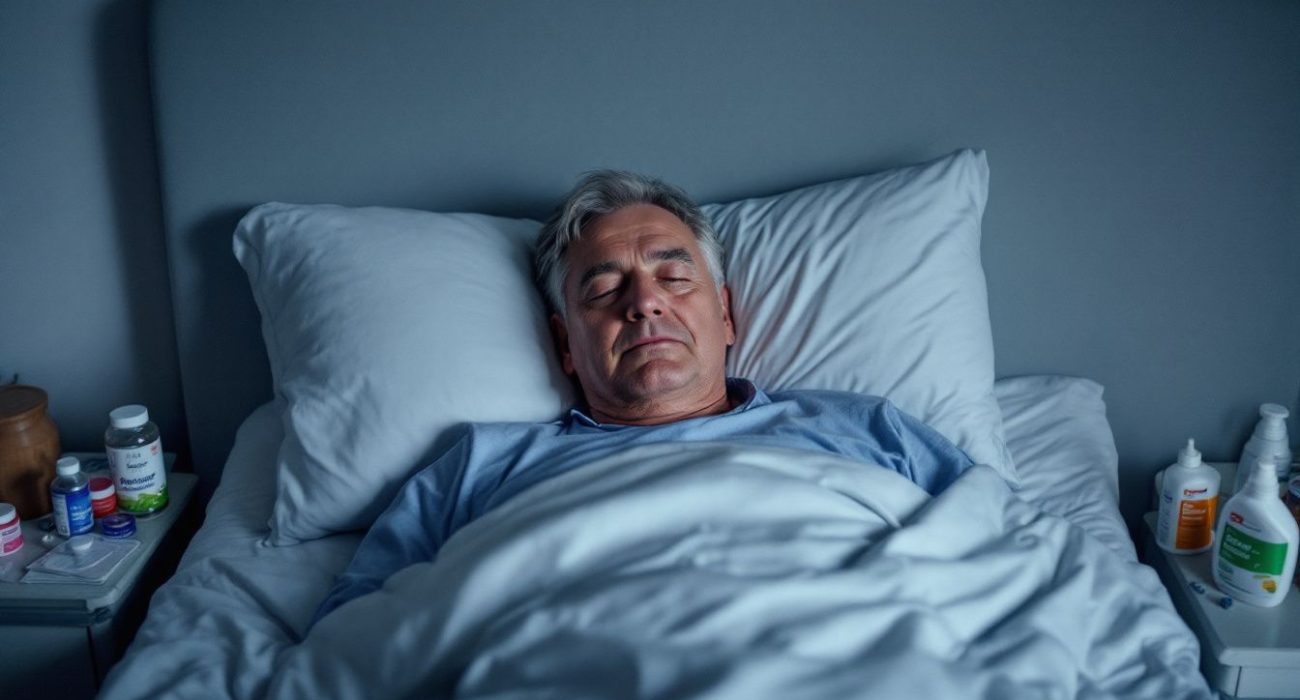Many people have trouble sleeping at night. Experts like Rebecca Robbins and Michael Grandner studied sleep aid myths. They found out which ones are not true and how they affect us.
Keep reading to learn more!
Myth: Your body gets used to lack of sleep

Your body doesn’t adapt to lack of sleep. Chronic sleep deprivation negatively affects both physical and mental health.
Fact: Chronic sleep deprivation harms physical and mental health
Lack of sleep hurts both your mind and body. People who don’t get at least 7 hours of sleep each night face big risks. They are more likely to become obese, have diabetes, high blood pressure, and think less clearly.
Also, not sleeping enough is a problem for about 1/3 of adults in the U.S. This issue costs the country over $40 billion every year.
Sleep disorders like insomnia are common too. Insomnia makes it hard for people to fall asleep or stay asleep. About 30% of Americans say they have symptoms of insomnia, and 10% have severe insomnia that doctors diagnose.
Not getting enough sleep can lead to serious health problems over time like heart disease and depression.
Myth: How long you sleep is all that matters

3. Myth: How long you sleep is all that matters, Fact: Sleep quality is just as essential as the duration. Read more to debunk common sleep myths.
Fact: Sleep quality is just as important as sleep duration
Good sleep is not just about how long you sleep. It’s also about how well you sleep. Good quality sleep means going through all the stages of sleep. This includes deep REM (rapid eye movement) sleep, where your brain rests and heals.
Poor quality rest can make you feel tired, even if you slept for a long time.
Exercising can help make your sleep better, even if you do it at night. Short naps before evening can also help without messing up your sleeping schedule. So, caring for how well you sleep is as crucial as caring for how long you sleep.
Myth: Alcohol helps you sleep better

Alcohol doesn’t improve sleep. It disrupts sleep cycles and reduces sleep quality.
Fact: Alcohol disrupts sleep cycles and reduces sleep quality
Drinking alcohol before bed is bad for sleep. It can mess up the normal cycles of sleep and make REM sleep start later. REM sleep is a deep part of sleeping when you dream and your brain rests.
If this part starts late, you don’t get enough rest. People who drink alcohol might go to sleep fast but won’t feel good in the morning.
Also, drinking alcohol makes symptoms of sleep apnea worse. Sleep apnea is a problem where people stop breathing for short times while they are asleep. This condition needs good quality sleep to keep under control.
So, having alcohol is not helpful if someone wants to improve their sleeping problems or stop loud snoring caused by apnea.
Myth: Staying in bed will help you fall asleep

Staying in bed when unable to sleep doesn’t help.
Sleep experts recommend getting up after 20 minutes of sleeplessness.
Fact: Experts suggest getting up after 20 minutes of sleeplessness
If sleep escapes you after 20 minutes, rise from your bed. Specialists in sleep wellness term this the stimulus control treatment for insomnia. Their consensus is that remaining alert in bed doesn’t aid in rest or recovery.
Instead, engaging in serene activities, such as reading under soft lighting could induce sleepiness.
This approach effectively disrupts the loop of anxiety that fosters wakefulness. It transforms your bed into a signal for sleep, rather than wakefulness. With time, this enhances your sleep initiation capability and improves the general quality of sleep.
Myth: A warm bedroom promotes better sleep
A warm bedroom may seem cozy, but cooler temperatures around 65°F are actually better for sleep. Read on to discover more about debunking common sleep aid myths and separating fact from fiction.
Fact: Cooler temperatures, around 65°F, are optimal for sleep
Cooler temperatures, around 65°F, are best for sleeping. This range helps improve sleep quality. Your body cools down to get ready for sleep. A cooler room fits this natural drop in temperature.
It makes falling asleep easier and keeps you asleep longer.
Keeping your bedroom at 65–68°F makes a big difference in how well you rest. This setup supports your body’s internal clock and its need to cool down for deep sleep phases. Making sure your sleeping space is within this temperature range can lead to better rest and health over time.
Myth: Napping can replace a full night’s sleep
Napping cannot make up for a full night’s sleep.
Short naps cannot fully compensate for insufficient nighttime sleep.
Fact: Naps don’t compensate for poor nighttime sleep
Brief periods of sleep for under 30 minutes early during the day can provide some relief without disrupting your night sleep routine. However, they can’t substitute missing vital hours of sleep at night.
Continuous lack of sleep every night connects to detrimental health effects, incorporating excess weight, elevated blood sugar, high blood pressure, and cognitive issues.
Excessive naps or excess rest during the day can disrupt your nighttime sleep schedule, resulting in lower-quality sleep cumulatively. It’s preferable to strive consistently for a satisfactory night’s sleep rather than depend on daytime sleep for rejuvenation.
Myth: Snoring is harmless
Snoring isn’t harmless; it may signal health issues like obstructive sleep apnea. If ignored, snoring can lead to serious conditions such as cardiovascular disease and cognitive impairment.
Fact: Snoring may indicate underlying health issues like sleep apnea
Loud snoring might just seem annoying, but it can be a sign of bigger health problems. One issue it points to is obstructive sleep apnea (OSA). This condition stops you from breathing right when you sleep, which is bad for your heart.
If someone snores a lot, they should check if they have OSA.
Getting help for sleep apnea is key. Doctors use things like positive airway pressure devices to treat it. This helps people breathe better at night and reduces snoring. When treated right, it also lowers the risk of heart problems.
So, listening to loud snoring could save someone’s health by spotting sleep disorders early.
Myth: Women and men have equal risks of insomnia
Women and men face the same risk of insomnia.
Read more to learn about sleep myths and facts.
Fact: Women have a higher lifetime risk of insomnia
Women face a 40% greater chance of experiencing insomnia than men. This means they are more likely to have trouble falling asleep or staying asleep through the night. About 30% of women report signs of this sleep problem, and 10% have been diagnosed with clinical insomnia.
This issue affects their sleep quality and can lead to other health issues.
Sleep hygiene plays a crucial role in tackling insomnia. But for many women, changes in life stages such as pregnancy or menopause add extra challenges to getting good rest. These biological shifts make it harder for them to maintain a healthy sleep schedule and enjoy the benefits of deep, restorative slumber.
Recognizing these differences is vital for finding solutions that work well for women struggling with sleep difficulties.
Myth: Watching TV before bed helps you relax
Watching TV before bed isn’t an effective relaxation technique. The screen’s blue light can interfere with melatonin production, disrupting your ability to fall asleep.
Fact: Screen time interferes with melatonin production
Using screens before bed disrupts sleep. The blue light from TVs and devices slows down melatonin release. Melatonin is a hormone that helps you sleep. So, screen time at night makes it hard to fall asleep.
Experts say to avoid screens before bedtime for better sleep health. They suggest turning off devices an hour before sleeping. This helps your brain get ready for rest.
Myth: Hitting the snooze button improves sleep
Hitting the snooze button doesn’t improve sleep quality or restfulness. It fragments sleep, disrupting the natural sleep cycle and leaving you feeling groggy.
Fact: Fragmented sleep from snoozing reduces restfulness
Hitting the snooze button can lead to fragmented sleep, making you feel less rested. It disrupts your sleep cycle, hindering deep and restorative rest, and affects your concentration, mood, and overall well-being the next day.
Setting a regular wake-up time is preferable to prevent fragmented sleep due to snoozing. Maintaining consistent sleep schedules improves sleep quality and enhances alertness during the day.
Therefore, resist the temptation to hit snooze for more energized days!
Myth: You eat spiders in your sleep
Myth: Some believe you swallow spiders while sleeping.
To learn more, click the link.
Fact: This is a baseless urban legend
This claim is not true. There’s no scientific proof to support this idea.
Myth: Sleeping with a light on is harmless
Sleeping with a light on doesn’t affect sleep quality
Light exposure at night can disrupt the body’s natural sleep-wake cycle
Fact: Darkness promotes optimal sleep quality
Sleeping in darkness is best for good sleep. It helps regulate your body’s internal clock and encourages the production of melatonin, a hormone that aids in falling asleep. Light disrupts this process.
Research indicates that exposure to light while sleeping can potentially lead to weight gain by interfering with metabolism and disrupting circadian rhythms. Therefore, it’s crucial to ensure a dark environment when aiming for high-quality sleep.
Myth: You can catch up on sleep over the weekend
You may think you can compensate for lost sleep over the weekend. However, sleep debt cannot be fully recovered in two days.
Fact: Sleep debt cannot be fully recovered in two days
Sleep debt can’t be fully recovered in just two days. If you’ve been losing sleep during the week, sleeping more on the weekend doesn’t completely make up for it. It’s like trying to catch up by doing extra work; you need consistent rest to keep your body and mind functioning well.
This means that if you’re skipping out on necessary sleep during the week, those few extra hours on Saturday and Sunday won’t undo all the damage. Consistency is essential for good sleep health.
So, prioritize getting enough shut-eye every day rather than hoping to “catch up” later.
Myth: Older adults need less sleep
For more information on debunking common sleep aid myths, visit our blog.
Fact: Sleep needs remain consistent throughout adulthood
Sleep needs don’t change much as one grows older. From young adulthood to late life, our bodies continue to require around 7-9 hours of sleep per night for optimal function and overall health.
This contradicts the belief that as adults age, they naturally require more sleep than younger adults do. Maintaining consistent nightly rest helps support physical activity, mental focus, and emotional well-being across all stages of adulthood.
How to Identify Myths About Sleep
Identifying Misconceptions About Sleep
Relying on evidence-based research and consulting sleep health professionals can help differentiate truth from misconception when it comes to sleep myths. These approaches are tailored to improve understanding of the complexities in the realm of sleep hygiene and disorders.
Look for evidence-based research
To separate fact from fiction about sleep, it’s crucial to actively search for research backed by evidence. This means seeking information and data that have been carefully studied and proven to be true through scientific methods.
Evidence-based research is the gold standard for credible and reliable information. You can rely on this kind of research as it has undergone rigorous testing and scrutiny by experts in the field, ensuring that the facts presented are accurate and trustworthy.
When working through an abundance of information about sleep aids, keep your focus on evidence-based research; consider consulting professionals who can guide you toward dependable resources.
Consult sleep health professionals
Before seeking guidance from sleep health professionals, it’s crucial to ensure the information is supported by evidence-based research. Sleep health professionals, such as sleep therapists or doctors specializing in sleep disorders, can offer personalized advice and interventions for various sleep-related concerns.
Seeking advice from these experts enables individuals to gain a comprehensive understanding of their specific sleep needs and tackle any underlying issues impacting their sleep quality.
This proactive approach promotes better sleep habits and improves overall physical and mental well-being.
Benefits of Understanding Sleep Facts
Understanding sleep facts can lead to improved sleep habits and enhanced physical and mental well-being. It helps in avoiding misconceptions, such as relying on unproven remedies or advice and misunderstanding sleep hygiene basics.
Improved sleep habits
Improved sleep habits contribute to enhanced physical and mental well-being. Prioritizing sufficient high-quality sleep is essential for overall health. Regular, restorative sleep enhances focus, efficiency, emotional state, and immune function while lowering the likelihood of chronic illnesses such as obesity and heart disease.
To attain these advantages, individuals should focus on establishing a cozy sleep environment, adhering to a consistent sleep routine, addressing stress levels before bedtime, and refraining from stimulants like caffeine or alcohol near bedtime.
Following these guidelines can lead to a notable enhancement in overall health and quality of life.
Enhanced physical and mental well-being
Improving your sleep habits leads to enhanced physical condition by reducing the likelihood of heart disease, diabetes, or obesity while also improving cognitive functioning for better mental wellness.
Good-quality sleep supports a healthy immune system, regulates mood to reduce stress levels in addition to positively influencing weight management.
Common Misconceptions to Avoid
Dispelling common sleep myths is essential for maintaining healthy sleep habits and overall well-being. Grasping the reality about sleep can prevent dependence on unproven remedies or advice, leading to enhanced sleep hygiene and better quality of life.
Misunderstanding sleep hygiene basics
Misunderstanding sleep hygiene basics can harm your overall well-being. It’s not merely about how much you sleep, but the quality of your sleep matters too. Often, people think that staying in bed when they can’t sleep is the right thing to do, but actually, getting up after 20 minutes may help.
And while many assume a warm bedroom aids restful slumber, experts suggest cooler temperatures around 65°F are optimal for good sleep. Also, keep in mind that darkness promotes better sleep quality compared to sleeping with a light on.
Understanding these facts can promote better habits and improve physical and mental health.
Relying on unproven remedies or advice
Following unproven remedies or advice about sleep can harm your well-being. It’s crucial to seek evidence-based research and consult sleep health professionals for reliable information.
Misunderstanding sleep hygiene basics can lead to poor sleep habits and contribute to sleep disturbances, which ultimately affects physical and mental health negatively.
Conclusion
In conclusion, comprehending sleep myths is essential for promoting better public health and individual well-being. Disproving widespread misbeliefs about sleep will lead to improved sleep habits and enhanced physical and mental well-being.
By addressing these myths, we can steer towards healthier practices and reduce the adverse impact of misinformation on public health. It’s important to consult with sleep health professionals and search for evidence-based research when seeking more than just beliefs about sleep aid.
Let’s embrace the facts, improve our knowledge, and unveil the secrets to a good night’s rest.

